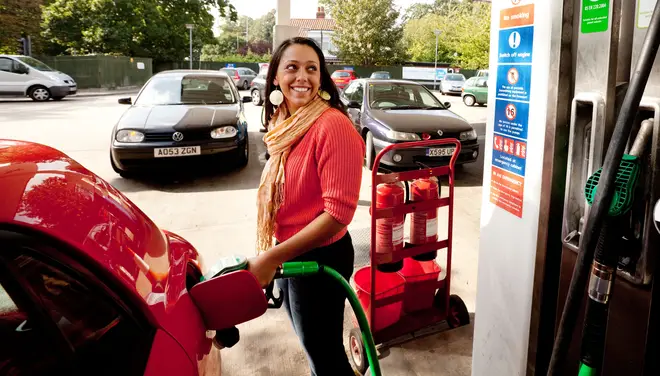
Ian Payne 4am - 7am
1 September 2021, 07:02 | Updated: 2 September 2021, 06:16

A new, cleaner form of petrol is being introduced at filling stations across the UK from Wednesday but a quarter of motorists are unaware of it, according to the RAC.
E10 petrol will become the standard offering at British forecourts as part of the government's plans to cut carbon emissions.
The fuel is made with up to 10 per cent bioethanol - a type of renewable fuel - and will replace E5, which consists of up to five per cent bioethanol.
More than 95 per cent of the nation's petrol cars are compatible with E10 - which is set to arrive in Northern Ireland early next year - according to the Department for Transport (DfT).
Read more: Inflation cools as clothes costs fall but petrol hits eight-year highs
Read more: BHP in talks over merger deal to exit petroleum sector

Business Secretary explains the ban on petrol and diesel cars
However, an RAC survey of 1,450 British drivers found that just under a quarter (24 per cent) of motorists are unaware of the new fuel, while a fraction more (27 per cent) do not know if their car is compatible with it.
The firm's head of policy Nicholas Lyes said: "E10 petrol has already started appearing on forecourts to replace the old E5 blend, and that process will continue at pace in the coming weeks.
"But while the vast majority of drivers of petrol cars aren't affected, a sizeable minority will be and the only way to be sure is to use the official online checker."
Motorists can use the government's online E10 checker to find out if their vehicle can be filled with E10.
Read more: Sales of new petrol and diesel cars and vans to be banned from 2030
Read more: Govt ‘has lost sight of motorists’ over 2030 petrol and diesel ban

Ban on sales of new petrol and diesel cars and vans brought forward to 2030
An impact assessment published in January 2020 estimated that around 600,000 cars - such as classic cars or those built in the early 2000s - would be incompatible with the new fuel this year.
Owners of those vehicles can continue to access E5 by purchasing super unleaded which costs an average of 8.7p a litre more than standard petrol, according to AA figures.
The DfT admitted that E10 can "marginally" reduce fuel economy but it insisted the impact is "almost unnoticeable to most drivers when making everyday journeys".
It stated that the rollout of E10 could cut transport CO2 emissions by 750,000 tonnes per year which is the equivalent of taking 350,000 cars off of UK roads.

End of the road for petrol cars: Peugeot director talks electric cars
Transport Secretary Grant Shapps said: "Every journey matters as we drive forward the green industrial revolution, which is why the rollout of E10 is so important.
"It'll help us cut road greenhouse gas emissions and meet our ambitious net-zero targets.
"Although more and more drivers are switching to electric, there are steps we can take today to reduce emissions from the millions of vehicles already on our roads.
"The small switch to E10 petrol will reduce greenhouse gas emissions as we accelerate towards a greener transport future."
AA president Edmund King said: "This is a positive and simple step to help reduce the carbon impact from road transport.
"While the vast majority of vehicles will be unaffected by the change, it is important for owners of older cars to use the government's vehicle checker to see if they can use E10.
"Even if E10 is put in a non-compliant vehicle, drivers should not panic and can simply put super unleaded in their tank at the next available opportunity."